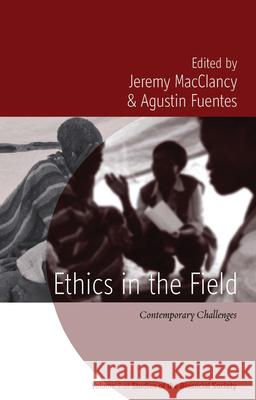Ethics in the Field: Contemporary Challenges » książka
Ethics in the Field: Contemporary Challenges
ISBN-13: 9781782387930 / Angielski / Miękka / 2015 / 224 str.
"Everyone who has anything to do with fieldwork should read this book. To my knowledge there is no other work, which so clearly demonstrates the kinds of ethical dilemmas that occur routinely in the field, in all their everyday, messiness...It will appeal to anyone working within anthropological or conservation based disciplines, but it will encourage scholars and students of virtually any discipline, even journalists, to think about the effects of their work. More, much more, this volume should be required reading for anyone who ever sits on an ethics committee." - Qualitative Research "This is an excellent volume that focuses on the ethics of field work. The topics considered represent a broad array that will be of interest to a wide audience. There is nothing like this to the best of my knowledge in the available literature, and the editors are highly recognized researchers who have done a very good job of attracting eminent scholars." - Marc Bekoff, University of Colorado "Contributors to this volume nicely and clearly present a diverse array of examples, case studies and data revealing the multi-dimensionality of ethics, as well as dilemmas and challenges that fieldworkers might expectedly or accidentally encounter and/or face during the course of their work." - Tatyana Humle, University of Kent In recent years ever-increasing concerns about ethical dimensions of fieldwork practice have forced anthropologists and other social scientists to radically reconsider the nature, process, and outcomes of fieldwork: what should we be doing, how, for whom, and to what end? In this volume, practitioners from across anthropological disciplines-social and biological anthropology and primatology-come together to question and compare the ethical regulation of fieldwork, what is common to their practices, and what is distinctive to each discipline. Contributors probe a rich variety of contemporary questions: the new, unique problems raised by fieldworking online and via email; the potential dangers of primatological fieldwork for locals, primates, the environment, and the fieldworkers themselves; the problems of studying the military; and the place of ethical clearance for anthropologists involved in international health programs. A further, distinctive aim of this book is to help the development of a transdisciplinary anthropology at the methodological, not theoretical, level. Jeremy MacClancy is Professor of Anthropology and Director of the Anthropological Centre for Conservation, the Environment, and Development at Oxford Brookes University. His publications include Expressing Identities in the Basque Arena (James Currey, 2007); Centralizing Fieldwork: Critical Perspectives from Primatology, Biological and Social Anthropology (co-edited, Berghahn Books, 2011); and Anthropology in the Public Arena: Historical Contexts (Wiley 2013). Agustin Fuentes is Professor of Anthropology at the University of Notre Dame. His recent publications include Evolution of Human Behaviour (Oxford University Press, 2009); Health, Risk, and Adversity (co-edited, Berghahn Books, 2008); "Concepts and Connections" in Biological Anthropology (McGraw-Hill, 2011); and Race, Monogamy and Other Lies They Told You: Busting Myths about Human Nature (University of California Press, 2012).
"Everyone who has anything to do with fieldwork should read this book. To my knowledge there is no other work, which so clearly demonstrates the kinds of ethical dilemmas that occur routinely in the field, in all their everyday, messiness...It will appeal to anyone working within anthropological or conservation based disciplines, but it will encourage scholars and students of virtually any discipline, even journalists, to think about the effects of their work. More, much more, this volume should be required reading for anyone who ever sits on an ethics committee." · Qualitative Research"This is an excellent volume that focuses on the ethics of field work. The topics considered represent a broad array that will be of interest to a wide audience. There is nothing like this to the best of my knowledge in the available literature, and the editors are highly recognized researchers who have done a very good job of attracting eminent scholars." · Marc Bekoff, University of Colorado"Contributors to this volume nicely and clearly present a diverse array of examples, case studies and data revealing the multi-dimensionality of ethics, as well as dilemmas and challenges that fieldworkers might expectedly or accidentally encounter and/or face during the course of their work." · Tatyana Humle, University of KentIn recent years ever-increasing concerns about ethical dimensions of fieldwork practice have forced anthropologists and other social scientists to radically reconsider the nature, process, and outcomes of fieldwork: what should we be doing, how, for whom, and to what end? In this volume, practitioners from across anthropological disciplines-social and biological anthropology and primatology-come together to question and compare the ethical regulation of fieldwork, what is common to their practices, and what is distinctive to each discipline. Contributors probe a rich variety of contemporary questions: the new, unique problems raised by fieldworking online and via email; the potential dangers of primatological fieldwork for locals, primates, the environment, and the fieldworkers themselves; the problems of studying the military; and the place of ethical clearance for anthropologists involved in international health programs. A further, distinctive aim of this book is to help the development of a transdisciplinary anthropology at the methodological, not theoretical, level.Jeremy MacClancy is Professor of Anthropology and Director of the Anthropological Centre for Conservation, the Environment, and Development at Oxford Brookes University. His publications include Expressing Identities in the Basque Arena (James Currey, 2007); Centralizing Fieldwork: Critical Perspectives from Primatology, Biological and Social Anthropology (co-edited, Berghahn Books, 2011); and Anthropology in the Public Arena: Historical Contexts (Wiley 2013).Agustín Fuentes is Professor of Anthropology at the University of Notre Dame. His recent publications include Evolution of Human Behaviour (Oxford University Press, 2009); Health, Risk, and Adversity (co-edited, Berghahn Books, 2008); "Concepts and Connections" in Biological Anthropology (McGraw-Hill, 2011); and Race, Monogamy and Other Lies They Told You: Busting Myths about Human Nature (University of California Press, 2012).











